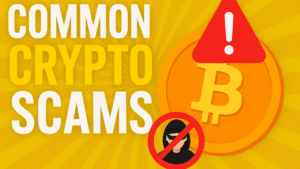 🚨 Common Crypto Scams: How to Spot and Avoid Them
🚨 Common Crypto Scams: How to Spot and Avoid Them
Cryptocurrency has revolutionized the way we think about finance, offering decentralized control, fast transactions, and global accessibility. But with innovation comes risk—and crypto scams are evolving just as fast as the technology itself. Whether you’re a seasoned investor or a curious newcomer, understanding the most common crypto scams is essential to protecting your assets.
In this post, we’ll break down the top scams plaguing the crypto space, how they work, and what you can do to stay safe.
🔍 Why Crypto Is a Prime Target for Scammers
Crypto’s appeal—anonymity, decentralization, and irreversible transactions—is also its vulnerability. Unlike traditional banking, there’s no central authority to reverse fraudulent transfers. Once your funds are gone, they’re likely gone for good.
Scammers exploit:
- Anonymity: Wallet addresses aren’t tied to real identities.
- Decentralization: No governing body to flag suspicious activity.
- Hype and FOMO: Many users rush into investments without due diligence.
🧠 8 Common Crypto Scams to Watch Out For
1. Phishing Scams
Scammers impersonate trusted platforms (like exchanges or wallets) via fake websites, emails, or social media. Their goal? Trick you into revealing your private keys or login credentials.
Red flags:
- URLs that mimic real sites (e.g., binancee.com)
- Urgent messages asking for sensitive info
- “Security alerts” that require immediate action
Tip: Always double-check URLs and never share your private keys.
2. Rug Pulls
A rug pull happens when developers promote a new crypto project, attract investors, and then suddenly withdraw all funds—leaving the token worthless.
Common in:
- DeFi platforms
- Meme coins
- NFT projects
Tip: Research the team, check for audits, and avoid projects with anonymous founders.
3. Fake Giveaways
“Send 0.1 ETH and get 1 ETH back!” Sound familiar? These scams often use fake celebrity endorsements or hacked social media accounts to lure victims.
Tip: No legitimate giveaway requires you to send crypto first.
4. Investment Scams
These scams promise guaranteed returns with little risk. Victims are often drawn in by slick websites, fake testimonials, and aggressive marketing.
Examples:
- Ponzi schemes
- “Crypto trading bots” with unrealistic ROI
- Fake hedge funds
Tip: If it sounds too good to be true, it probably is.
5. Romance Scams
Scammers build emotional relationships online and then convince victims to invest in fake crypto schemes or send funds directly.
Tip: Be cautious when online relationships involve financial requests—especially in crypto.
6. SIM-Swap Attacks
Hackers take control of your phone number by tricking your mobile provider. Once they have access, they can reset passwords and drain your crypto wallets.
Tip: Use two-factor authentication apps (like Authy or Google Authenticator) instead of SMS.
7. Fake Exchanges and Wallets
These platforms look legitimate but are designed to steal your funds once you deposit or connect your wallet.
Tip: Stick to well-known, verified platforms and read user reviews before signing up.
8. Cloud Mining Scams
These scams offer “guaranteed profits” from mining crypto without hardware. In reality, they’re just collecting subscription fees and never mining anything.
Tip: Real mining requires transparency, hardware specs, and proof of payouts.
🛡️ How to Protect Yourself from Crypto Scams
Staying safe in the crypto world requires vigilance and education. Here are some best practices:
- ✅ Use hardware wallets for long-term storage.
- ✅ Enable multi-factor authentication on all accounts.
- ✅ Verify URLs and social media accounts before interacting.
- ✅ Avoid unsolicited messages offering investment opportunities.
- ✅ Keep software and antivirus tools updated.
📈 Crypto Scams: Final Thoughts
Crypto scams are becoming more sophisticated, but so are the tools to fight them. By understanding the tactics scammers use and staying informed, you can navigate the crypto space with confidence.
Whether you’re building a portfolio, launching a project, or just exploring the blockchain ecosystem, remember: security is not optional—it’s foundational.